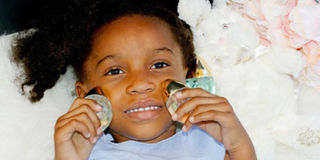Think before using that scent around your child

Unlike adults, new-borns respond and react to scents such as perfumes, deodorants, Vaseline, hair sprays, soaps and air fresheners, among others, differently. While an adult is able to identify and understand that they are being affected by a particular scent, the only way through which babies can tell or communicate when they are being affected by scents is through signs and reactions.
Breathing difficulties
Irene Asiimwe, a mother of two, says two months after giving birth to a baby boy, the baby was always carried by different people at home, and sometimes visitors that flocked her home in Kyanja, something she had little control over.
“One day, my brother visited but he was wearing a strong perfume. When he carried my son, after sometime I noticed that the baby’s breath was laboured. He was breathing through his mouth, and not the nostrils. I quickly took the baby outside for some fresh air and when he dosed off, I noticed that his breathing was back to normal. It was then that I understood that scents should not be used close to babies,” Asiimwe recalls.
Harmful ingredients
Dr Kezekia Tumwebaze Kibirigyi, a general practitioner at Rainbow City Hospital in Namuwongo, Kampala, says most, if not all perfumes or scents, carry components such as phthalates, methylene chloride and linalool that are harmful to babies. These components especially phthalate affects the blood pressure flow, the rate at which your baby’s heart beats and supply of blood to the brain and may at times cause migraine headaches.
Most of the scent components, he observes, do not only cause allergic reactions to babies but also retard or bring about abnormal growth of some of the baby’s internal sensory organs such as the nostrils. Some of the other components such as tonalide and galaxolide manufactured in scents are also toxic not only to the newborn baby but also one that is not yet born.
“When your baby inhales these strong components, it causes nasal congestion. In some cases, it can also cause throat or chest congestion or constriction and the baby may end up developing an asthma attack. If you do not stop using perfumes or any other scents near the baby, they also develop allergies. In extreme cases of developing asthma and allergy, the baby may experience an anaphylactic shock,” Dr Tumwebaze explains.
Anaphylactic shock
According to Tumwebaze, an anaphylactic shock is defined as the severe allergic reaction of a baby or any other person to a given substance. Anaphylactic shocks, he adds, are sometimes coupled with swelling of the baby’s skin, swelling of the face and dry cough. These signs, he says, usually occur between one to three hours from exposure and that they mostly occur in babies less than a year old.
“The fact that most, if not all baby soaps, vaselines and oils are scent-free should best explain why you should not put the life of your baby at risk simply because you want to smell good,” the doctor warns
When you continuously expose your baby to scents, Dr Henry Musinguzi, a general practitioner at Nyakibale Referral Hospital says, it weakens their immunity system in the long run.
“When your baby’s immunity system is weakened, it means it will subject or open your baby’s health to any sort of infection or illness. The best remedy is to keep scents out of your home. If you use rinsing detergents in the baby’s clothes, it is advisable to rinse them as more times as you can so that they do not inhale the scents from their clothes,” Musinguzi advises.
Wearing perfume around your baby is personal choice, but knowing the facts can help to inform your decision. If you can’t give up the good smells, try using natural perfumes or essential oils, which can provide the same intoxicating scents without the toxic side effects.
Common sources of scents
Away from the body, other sources of scents include air fresheners, baby hair shampoos, washing detergents and in rare cases, insecticides.
Alternatives
You can make your home and your baby’s environment as free from detrimental chemical exposure as possible. Choose to not wear perfume. Invest in cleaning, household and hygiene products that do not contain toxic chemicals. Read labels carefully, as manufacturers often use misleading terminology to advertise a product as “fresh” or “natural.” Avoid using room sprays. Buy body products that do not contain fragrance for both yourself and your baby.




